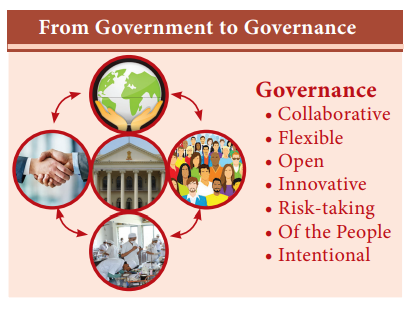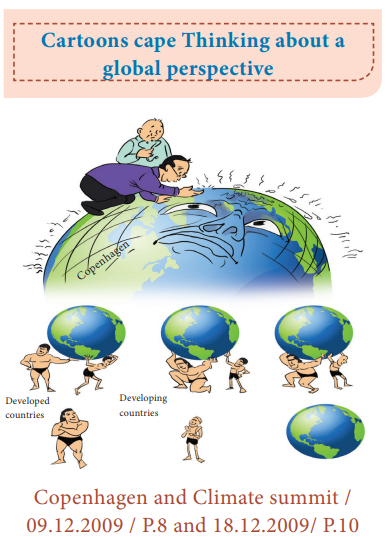Chapter: 11th Political Science : Chapter 6 : Forms of Government
The Concept of Governance from Government to Governance
The Concept of Governance from Government to Governance
Good governance is an indeterminate term used in
the international development literature to describe how public institutions
conduct public affairs and manage public resources. Governance is “the process
of decision-making and the process by which decisions are implemented”.

“Government” and “governance” are synonyms, both
denoting the exercise of authority in an organization, institution or state.
Government and governance became distinguished along the following dimensions:
a.
What activities are encompassed
in the act of governing?
b.
What actors are involved in
governance?
c.
What processes have made this
redefinition necessary?
d.
What criteria are used to
evaluate good governance?
e.
What capacities should be
developed to achieve it?
Governance is the exercise of political, economic
and administrative authority to manage a nation’s affairs…Governance embraces
all of the methods – good and bad– that societies use to distribute power and
manage public sources and problems (UNDP, 1997):
Governance is the manner in which power is
exercised in the management of a country’s social and economic resources for
development (ADB, 2000)
The movement from government to governance is not
merely a task of creating new institutions but also that of refurbishing old
ones. The state has to be strengthened to play a new role. It is also for the
civil society to accept that democracy is not going to polls every five years
but being vigilant and monitoring institutional performance and holding them accountable
throughout these years.
Partnership with civil society
In the shift of government to governance the role
of civil society has been very significant. There have been two kinds of
strands in this role,
a. Social
Movements
b. Non-Governmental
Organizations
Social Movements which works for the cause of poor
and marginalized do influence the governments to be responsive to their needs
through changes in institutions, laws and procedures.
NGO’s have taken up diverse roles that also involve
implementation of government programmes.
Social movements and NGO’s occupied new spaces in
the political process and delivering public services.

197 Nations agree to phase out AC greenhouse gases.
Legally – binding deal to tackle
global warming, reduce use of gas 1,000 times worse than CO2
3 GROUPS OF NATIONS
Developed countries including the US must slash their use of
HFCs’ by 10 percent by 2019 from 2011-2013 levels, and then by 85 percent by
2036.
A second group of developing countries, including
China and Africa nations, are committed to launching the transition in 2024. A
reduction of 10 percent compared with 2020-2022 levels should achieved by 2029,
to be extended to 80 percent by 2045.
A third
group of developing countries, which include India, Pakistan, Iran, Iraq and
Gulf nations, must begin the process in 2028 and reduce emissions by 10 per
cent by 2032 from 2024-2026 levels, and them by 85 percent by 2047
KIGALI (RWANDA)
In a major step toward curbing global warming,
envoys from nearly 200 nations reached and agreement on Saturday to phase out
potent greenhouse gases used in refrigerators and air conditioners. Under the
amendment to the 1987 Montreal Protocol on protecting the ozone layer, rich
countries are to take action sooner than developing nations.
The agreement was greeted by applause from
exhausted envoys who had worked through the night in the Rwandan capital Kigali
to put the final touches on the deal to phase our production and consumption of
hydroflurocarons (HFCs)
But some representatives voiced regret that
countries such as India, Pakistan, and Gulf nations would begin the transition
later than others. “It may not be entirely what the islands wanted, but it is a
good agreement,” said a representative of the tiny pacific nation of the
Marshall Islands. The elimination of HFCs could reduce global warming by 0.5
degrees by 2100, according to a 2015 study.
However, swapping HFCs for alternatives such as
ammonia, water or gases called hydroflurolefins could prove costly for develop
countries with sweltering summer temperatures, such as India. “There are issues
of cost, there are issues of technology, there are issues of finances,” said
Ajay Narayan Jha of India’s environment and climate change ministry before deal
was announced. “We would like to emphasize that any agreement will have to be
flexible from one side and not from the other,” he had said.
HFCs’ predecessors, chlorofluorocarbons (CFCs),
were discontinued under the Montreal Protocol when scientists realized they
were destroying the ozone layer. But it emerged that HFCs, while safe for the
now healing ozone, are thousands of times worse for trapping heat than carbon
dioxide, the main greenhouse gas.
The new Indian express: 16.10.2016
Thinking about a global perspective
A global perspective asks you to
think beyond yourself, your family, your school, your community, your village,
your district, your state or country where you are living. Issues that are in
the news are after global in nature for ex., environmental issue.
Often, a global issue or problem
demands a global solution. It would not be possible to solve the global problem
of climate change with a local solution, even though local courses of action
might be taken to help towards a global solution. For the problem of climate
change, for ex., a local course of action might be creating awareness through
street play or exhibition or human chain or a poster campaign aimed at
encouraging people think globally and act locally.
Characteristics of good governance
i. Participation
All men and women should have a voice in
decision-making, either directly or through legitimate intermediate
institutions that represent their interests. Such broad participation is built
on freedom of association and speech, as well as capacities to participate
constructively.
ii. Rule of Law
Legal frameworks should be fair and enforced
impartially, particularly the laws on human rights.
iii. Transparency
Transparency is built on the free flow of
information. Processes, institutions and information are directly accessible to
those concerned with them, and enough information is provided to understand and
monitor them.
iv. Responsiveness
Institutions and processes try to serve all
stakeholders.
v. Consensus orientation
Good governance mediates differing interests to
reach a broad consensus on what is in the best interests of the group and,
where possible, on policies and procedures.
vi. Equity
All men and women have opportunities to improve or
maintain their well-being.
vii. Effectiveness and efficiency
Processes and institutions produce results that
meet needs while making the best use of resources.
viii. Accountability
Decision-makers in government, the private sector
and civil society organizations are accountable to the public, as well as to
institutional stakeholders. This accountability differs depending on the
organizations and whether the decision is internal or external to an
organization.
ix. Strategic Vision
Leaders and the public have a broad and long-term
perspective on good governance and human development, along with a sense of
what is needed for such development. There is also an understanding of the
historical, cultural and social complexities in which that perspective is
grounded.
Source: UNDP (1997) Governance for Sustainable Human
Development.
United Nations Development Programme.
Related Topics